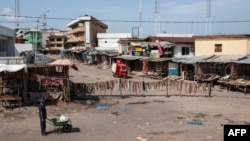Members of Nigeria's Biafran separatist movement on Tuesday marked 50 years after civil war saw more than one million people die trying to create a state for the Igbo people.
Residents in Onitsha in the southeast staged a "stay home" to reflect on those who died fighting from 1967 to 1970. The action also was meant to disrupt economic activities in the commercial hub.
The Igbo are one of Nigeria's largest ethnic groups but remain largely marginalized in politics. Some still call for a separate state.
"People are really suffering. We have been marginalized so much, so that is why we are agitating for the sovereign state of Biafra," said one street trader, Elebo Nicholas.
Posters showed images said to be of starving children during the conflict. Hunger became a weapon, as the region long had relied on other parts of the country for food.
On Sunday, Nnamdi Kanu, the leader of The Indigenous People of Biafra, spoke to cheering supporters in Umuahia city.
"The injustice is still there, the deprivation is still there, the subjugation is still there," he said. "Unfortunately it's not been addressed, so we wish to deal with it once and for all."
Kanu's arrest in 2015 led to protests. Amnesty International has said Nigeria's military killed at least 150 peaceful protesters between August 2015 and August 2016 and detained hundreds demonstrating in support of the breakaway state.
The roots of Biafra came from a 1966 failed coup led primarily by Igbo army officers who killed the prime minister, who came from Nigeria's north. Angry northerners attacked Igbos living there.
The declaration of the largely Igbo region that includes part of the oil-rich Niger Delta as the Republic of Biafra then sparked civil war.




